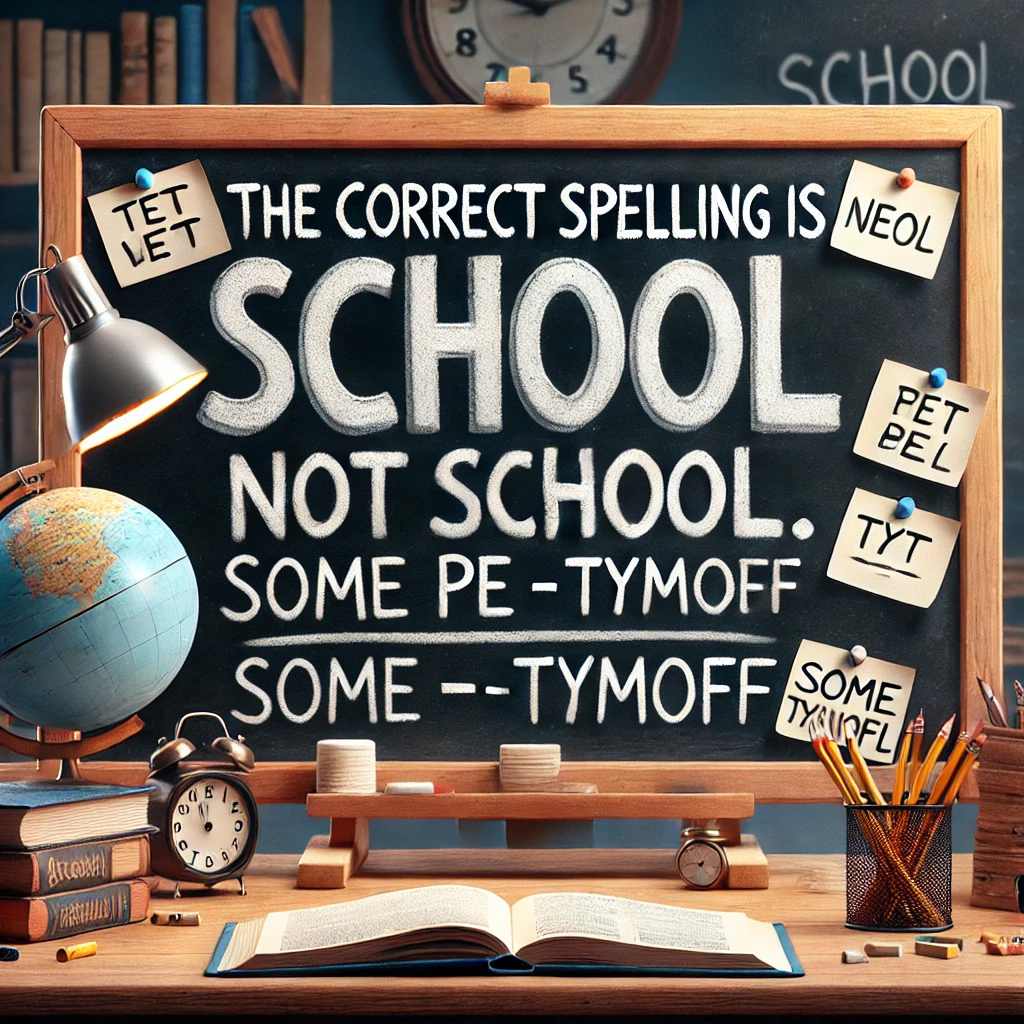Introduction: Why Spelling Matters
Spelling may seem like a small detail, but it has a significant impact on how we communicate. In both personal and professional settings, correct spelling ensures clarity, credibility, and a polished image. One common phrase that brings attention to the importance of accuracy is the correct spelling is school not school. some pe – tymoff. While humorous in nature, it serves as a reminder that even common words can be easily misspelled, leading to misunderstandings or misinterpretations. In this article, we’ll explore why spelling matters, how it has evolved, and how you can avoid common mistakes.
The Evolution of the Word “School”
The word “school” has a fascinating history, tracing back to the Greek word scholē, which initially meant “leisure” or “free time.” Over time, the word evolved to represent a place of learning and instruction. As it passed through Latin into Old English as scolu, its meaning became what we understand today: an institution where learning takes place.
This evolution is a reminder of how language changes over time, and with it, the spelling of words. However, some words, like “school,” have retained their spelling for centuries. Understanding this history can help appreciate why getting the spelling right is crucial. In contrast, the phrase the correct spelling is school not school. some pe – tymoff points out the absurdity of needing to correct such a well-known word, but it also highlights the importance of careful attention to spelling.
Why Correct Spelling Matters
Correct spelling is essential for several reasons, especially in educational and professional contexts. Let’s break down why spelling accuracy holds so much weight:
Clarity and Precision
When words are spelled correctly, they convey the intended message without confusion. A simple error, such as writing “scool” instead of “school,” may seem minor, but it can disrupt the reader’s understanding. Clarity is particularly important in formal writing, where any ambiguity can detract from the main message. In contrast, casual spelling errors may lead to miscommunication in everyday conversations, especially online.
Professionalism
In professional settings, correct spelling demonstrates attention to detail. Whether you’re writing an email, a report, or a business proposal, misspelled words can undermine your credibility. Spelling mistakes suggest a lack of thoroughness, and in competitive environments, even small errors can make a negative impression. For instance, repeatedly writing “scool” instead of “school” in a job application could make you seem unprofessional or careless.
Self-Confidence
Mastering spelling boosts self-confidence. Whether you’re a student writing an essay or a professional drafting a presentation, knowing that your spelling is correct allows you to focus on the content rather than worrying about errors. People who are confident in their spelling abilities tend to communicate more effectively and project a sense of competence.
Common Misspellings of “School” and Their Implications
Despite being a simple word, “school” is often misspelled. Common variations include “scool,” “shcool,” and “schol.” These errors, though seemingly trivial, can have broader implications, especially in professional and academic contexts.
Misspellings can lead to misinterpretations of your message. In formal settings, they may reflect poorly on your attention to detail.The accurate spelling is “school,” not “school.” some pe – tymoff humorously points out the redundancy of such corrections, but it serves as a reminder that even the most familiar words need careful attention.
The Role of Spelling in Professional and Academic Settings
Spelling errors in academic work can lower grades, while in professional environments, they can harm your reputation. Employers and educators often associate correct spelling with competence and attention to detail.
In business, spelling mistakes can lead to miscommunication or give the impression that you’re not taking your work seriously. In academic settings, poor spelling can undermine the credibility of your research and affect your overall performance. For example, consistently misspelling “school” in an essay could result in lower marks, even if the content itself is strong.
How Spelling Errors Impact Digital Communication
In the digital age, where much of our communication happens online, spelling mistakes can have even greater consequences. Social media posts, emails, and text messages are often scrutinized for accuracy. A single misspelled word, such as “scool” instead of “school,” can go viral for the wrong reasons.
Search engines like Google also prioritize correct spelling in their algorithms. If your blog post or website contains frequent spelling errors, it may rank lower in search results, reducing visibility. This is why phrases like the correct spelling is school not school. some pe – tymoff highlight the importance of getting it right, especially in the digital realm.
Strategies to Improve Spelling Skills
Improving your spelling takes practice, but there are several strategies you can use to minimize mistakes and become more confident in your writing.
Regular Reading and Writing
One of the most effective ways to improve your spelling is through regular reading and writing. Exposure to correct spellings in books, articles, and essays helps reinforce the visual patterns of words. The more you read, the more familiar you become with the correct spelling of common words like “school.”
Writing frequently also helps. Whether you’re journaling, writing emails, or drafting reports, the act of writing forces you to focus on spelling. Over time, you’ll observe a gradual enhancement in your precision.
Using Spelling Tools and Software
Modern technology offers a range of tools to help with spelling. Spell checkers and grammar tools, like Grammarly, can catch errors and suggest corrections in real time. These tools are especially useful for professionals who want to ensure their emails, reports, or presentations are error-free.
While these tools are helpful, it’s important to review their suggestions carefully. Sometimes, spell checkers may miss context-specific errors, so it’s always a good idea to double-check your work manually.
Learning Spelling Rules and Patterns
Understanding common spelling rules and patterns can significantly reduce errors. For instance, the guideline “i before e except after c” assists with words such as “receive” and “believe.” Similarly, recognizing prefixes, suffixes, and root words can help predict the spelling of unfamiliar terms.
For the word “school,” it’s helpful to remember that it retains its original Greek structure. Knowing the history of words can aid in understanding and remembering their correct spelling.
Pronunciation and Phonetics
Paying attention to how words sound can also help with spelling. Phonetic awareness allows you to break down words into their individual sounds, making it easier to spell them correctly. Pronunciation guides and phonetic exercises can be useful tools in this process.
The Role of Technology in Spelling Improvement
In addition to spell checkers, there are several other technological tools that can help you improve your spelling. Apps like Quizlet and Memrise offer spelling exercises and quizzes that make learning fun and engaging.
Voice recognition software can also assist in identifying correct spellings based on pronunciation. By speaking the word aloud, the software provides suggestions, helping reinforce the correct spelling in your mind.
Conclusion
Spelling is more than just a technical skill—it’s a reflection of your attention to detail and your ability to communicate effectively. The accurate spelling is “school,” not “school.” some pe – tymoff may seem amusing, but it underscores the importance of accuracy in even the most basic words. Whether in professional or academic settings, correct spelling helps convey your message clearly and enhances your credibility.
By understanding the historical context of words like “school,” recognizing the impact of misspellings, and using practical strategies to improve, you can become a more effective communicator. With the help of modern tools and consistent practice, mastering spelling is an achievable goal for anyone.
FAQs
Why is correct spelling important?
Correct spelling ensures clarity and prevents misunderstandings. It’s crucial in both academic and professional contexts where precision is key.
What is the origin of the word “school”?
The word “school” comes from the Greek word scholē, meaning “leisure.” It evolved to mean a place of learning over centuries.
How can I improve my spelling skills?
You can improve your spelling by reading regularly, using spelling tools, learning spelling rules, and paying attention to pronunciation.
What are the consequences of spelling errors in digital communication?
Spelling errors in digital communication can lead to misunderstandings and may harm your online presence or SEO rankings.
How does pronunciation help with spelling?
Pronunciation helps break down words into individual sounds, making it easier to spell them correctly.



